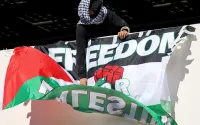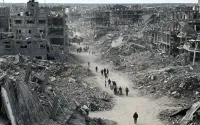Common Dreams / Published on Monday, April 7, 2003 by the lnternational Herald Tribune
While American troops have begun their attack on Baghdad, the coalition forces still have not taken any of Iraq's major cities.
They have thus far controlled desert and agricultural land, but the cities have been bypassed. There has been fear of the casualties urban fighting would inflict on all sides.
American military sources suggest that there is a plan for taking the modern city of Baghdad via its major thoroughfares, avoiding the dense and dangerous old city. But it is nonetheless a gamble to leave the other cities behind, as they remain a threat to the long line of communications from Kuwait. Doing so represents a bet that Baghdad will be taken quickly, and when that happens that the regime will collapse across the country.
Thus Basra and the other bypassed cities remain under Iraqi control. But of which Iraqis? State or municipal authorities? The military command? Party militants?
The Washington Post reports that travelers reaching Baghdad from southern Iraq say the Ba'ath Party apparatus still has "at least 90 percent" control of Basra, An Nasiriyah, Hilla and the Shiite shrine city of Karbala.
A Wall Street Journal report says that "mayhem and anarchy," with looting and vandalism, characterize places such as Umm Qasr, Iraq's main seaport, near Basra, where the party has lost control, the police have fled, and the fighting and bombing have destroyed or damaged the industrial and municipal infrastructure.
British and American forces are less interested in restoring order than in protecting themselves from attack and harassment by troops or militants concealed among civilians or wearing civilian clothes. Guerrilla attack provokes panic, with reckless fire on civilians, adding to the chaotic conditions in the zones the coalition main forces have bypassed.
Queried about the mayhem, a British Army spokesman near Basra replies, "Do I look to you like I'm a policeman?" Army civil affairs teams are trained to restore water supplies and electricity, not deal with chaos, and the priority of the military command and its political leadership in Washington is taking Baghdad.
This chaos is the predictable consequence of the allied attack. Create a battlefield and destroy existing structures of government, and this is what happens. The allies did not seriously prepare for this development because the absurd ideological preconceptions of American planners, and listening to the dreams and illusions of Iraqi exile politicians, had convinced them that the invading army would be welcomed by happy crowds, civic structures still intact.
Officials were convinced that Saddam Hussein's regime would "collapse at the first whiff of gunpowder." Like the president himself, they believed their "instincts" were better than actual knowledge about Iraq - or, for that matter, about battlefields.
Avowedly tough-minded, they might have consulted Carl von Clausewitz, who wrote that "philanthropists may easily imagine that there is a skillful method of disarming and overcoming an army without causing great bloodshed ... (but this) is an error which must be extirpated; for in such dangerous things as war, the errors which proceed from a spirit of benevolence are the worst."
The neoconservative leadership thinks of itself in "philanthropic" terms and has convinced others in Washington and in the country to take it as such. It really believes that it is bringing democracy and enlightenment to Iraq.
Whatever the intentions, the immediate result of what Washington is doing is to produce chaos. The neoconservatives like to quote the economist Joseph Schumpeter on "creative destruction," as if this phrase, meant to describe a process in the development of capitalism, were a general statement of truth, guaranteeing that destruction produces creation. It does not.
One of the many curious things President George W. Bush is quoted as saying, this time in Bob Woodward's book, "Bush at War," is that U.S. strategy in Afghanistan "is to create chaos, to create a vacuum." Out of the chaos and vacuum, good would come. This echoes the Trotskyist belief in the constructive effect of "permanent revolution."
It has another resonance as well, an apocalyptic religious one, of interest as the president is said by some to see his presidency within the context of the biblical narrative of the end of days. He certainly thinks of the United States as the vessel of mankind's salvation.
Woodward ends his book with another quotation from the president, uncomfortably apposite: "We will export death and violence to the four corners of the Earth in defense of our great nation."






